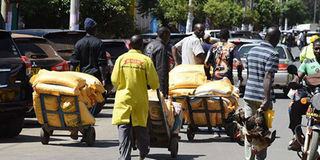Covid-19 fears cast shadow over food safety

Farmers buy maize seeds in Eldoret, Uasin Gishu County, on March 23, 2020. PHOTO | JARED NYATAYA | NATION MEDIA GROUP
What you need to know:
- Ms Beatrice Mwanzia, a farmer in Nakuru, lamented that most of the companies supplying farm inputs have closed down.
As the Covid-19 pandemic continues to wreak havoc on the economy and lifestyles, grain farmers in the North Rift region are in a catch-22 situation.
The heavens have opened but none dare venture out to plant. Fears of infection and restrictions on movement have spawned a severe shortage of labour, seeds and fertiliser.
The country has already reported at least 25 confirmed cases. This is compounded by the recent invasion of desert locusts with fears rife over the precarious state of the country’s food security.
Several farmers have expressed fears that the planting season will extend to April and May. Seed producers - including the Kenya Seed Company - have suspended operations.
“Due to the (coronavirus outbreak), we are temporarily closing our doors ... to promote self-quarantine,” Simlaw Seeds, a subsidiary of Kenya Seed Company, said in a notice in its Eldoret outlet.
“Unscrupulous dealers are likely take advantage of the impending shortage to sell uncertified seeds to farmers,” said Mr James Tiony, a farmer in Saos, Nandi County.
PRICES RISE
And the fears are not unfounded. A 25kg bag of maize seeds is now going for Sh4,800 up from Sh4,500.
Farmers interviewed by the Nation said they are unable to buy farm inputs as the planting exercise commences.
"We have prepared our farms but we are not able to get seeds and other essential inputs. This will affect the planting season and in turn delay harvesting,” said Trans-Nzoia farmer David Mirukaa.
Farmers were expected to take advantage of the start of the long rains in March and April to plant but the partial lockdown has scuttled the plans.
Ms Beatrice Mwanzia, a farmer in Nakuru, lamented that most of the companies supplying farm inputs have closed down.
"I urge the government to work closely with farmers organisations and cooperatives to ensure that the inputs are available and affordable. The government should also ensure traders do not take advantage of the situation to hike prices,” she said.
STAYING SAFE
The farmers are now imploring the government to put in place measures to ensure that food production continues.
The situation has left Mzee James Maina, 75, a farmer in South Kinangop, Nyandarua County, worried.
For the past decade, he has been making a living growing maize, beans and potatoes on his five-acre farm, but things look grim this season.
He has prepared his land but lacks seeds and fertiliser. "I don't know what to do. I cannot access fertiliser and seeds. This will greatly affect my plans," he said.
The fear of contracting the disease has also forced farmers in Elementaita, Nakuru County, to postpone planting altogether.
Ms Miriam Njeri’s three-acre farm is ready and she had planned to go travel to Nakuru Town to buy seeds. She however abandoned the idea after the confirmed Covid-19 cases hit 25 this week.
"The fear of getting the virus is scaring me. I am now stuck. The best way is for the government to bring the inputs to farmers," she said.
LABOUR PROBLEMS
Another farmer, Mr Kamau Macharia, said he cannot risk his life to board a matatu to Nakuru town because of the pandemic.
"This thing is not a joke. Even though the government has outlined several measures including social distancing, I cannot risk my life going to Nakuru town to purchase seeds, "he said.
In parts of the North Rift and South Rift, the country's food basket, farmers are yet to get the inputs.
According to Mr James Kipkorir, they face possible labour shortages. “Movement restrictions are likely to prevent many of the casual labourers from travelling, which will greatly affect the planting season,” said Mr Kipkorir.
Meanwhile, More than 100,000 farmers in three counties - who buy seeds from Kenya Seed Company - are set to be insured against losses linked to effects of climate change, pest and diseases, the firm announced.
CUSHION FARMERS
Managing Director Azariah Soi said the firm, through the Kenya Agricultural Insurance Programme, has partnered with Pula Agro-insurance Company to cushion farmers in Uasin Gishu, Nakuru and Kakamega counties against losses.
“We need a plan so that in the event of losses, you can recover your investment. Farmers had to sell off land to pay back loans due to the losses,” Mr Soi said during the signing of the MoU in Eldoret last week.
He said productivity has declined due to climate change and pests like maize necrosis, head smut, and stem borer.
Mr Soi revealed that some 7,000 farmers have been registered to pilot the project with plans to roll it out across the country next season.
Through the partnership, insured farmers will access compensation in case of poor harvests caused by a variety of risks including locusts, floods, pests and diseases and drought.
Reported by Barnabas Bii, Onyango K’Onyango, Eric Matara and Samuel Baya.




